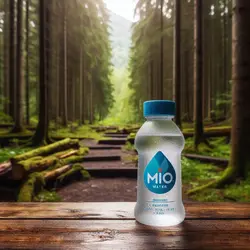Is Mio Bad For You? Benefits, Risks, and Everything You Need to Know
Mio is a popular water enhancer. Many people use it to add flavor to their water. It comes in small, colorful bottles. But, is Mio bad for you? Let’s find out.
The Short Answer
Is Mio Bad For You?
Mio is generally safe for most people. However, it contains artificial sweeteners and colors, which some may want to avoid. Use it in moderation and consult your doctor if you have concerns.
The Long Answer
What is Mio?

Mio is a liquid water enhancer. It is made by Kraft Foods. It comes in many flavors like Berry Blast and Peach Mango. People use it to make plain water taste better. You just squeeze a few drops into your water.
Ingredients in Mio
Mio has several ingredients. Some of these are:
- Water
- Citric acid
- Propylene glycol
- Sucralose (a sweetener)
- Acesulfame potassium (another sweetener)
- Artificial flavors
- Artificial colors
Is Mio Safe?
Mio is generally safe to use. The FDA approves its ingredients. This means they are safe in small amounts. Many people use Mio without problems. However, some ingredients might be a concern.
Artificial Sweeteners
Mio contains artificial sweeteners like sucralose and acesulfame potassium. These sweeteners are low in calories. They are much sweeter than sugar. Some people worry about artificial sweeteners. Studies show mixed results. Most studies say they are safe in small amounts. But, some people prefer to avoid them.
Artificial Colors
Mio uses artificial colors to look appealing. These colors are also FDA-approved. Some people think artificial colors can cause problems. They might cause allergies or hyperactivity in children. Research is ongoing.
Propylene Glycol
Propylene glycol is another ingredient in Mio. It helps mix the flavors evenly. It is generally safe. It is used in many foods and medicines. But, some people might be sensitive to it. It can cause mild irritation in large amounts.
Citric Acid
Citric acid gives Mio its tangy taste. It is found naturally in citrus fruits. It is safe to consume. But, too much citric acid can erode tooth enamel. It can make teeth sensitive.
Mio Water Enhancer Side Effects
While Mio is safe for most people, some might experience side effects. Common Mio water enhancer side effects include stomach problems, such as mild stomach aches or irritation. If you use Mio in large amounts, you might experience more discomfort.
Can Mio Cause Diarrhea?
Mio contains artificial sweeteners, which can affect digestion. Some people might wonder. In some cases, consuming large amounts of artificial sweeteners can lead to diarrhea.
Also, read Does Mio Cause Cancer?
Benefits of Mio
Mio can help you drink more water. Many people do not drink enough water. Adding flavor can make water more enjoyable. Staying hydrated is important. It helps your body function well.
Potential Concerns
While Mio is safe for most people, there are concerns:
- Artificial sweeteners: Some people prefer natural sweeteners.
- Artificial colors: Some believe they cause health problems.
- Sensitivities: A few might react to propylene glycol or citric acid.
- Digestive issues: Large amounts might cause stomach problems or diarrhea.
How Much Caffeine Is in Mio Energy?
Mio also offers a line called Mio Energy. It contains caffeine to boost your energy levels. But how much caffeine is in Mio Energy? Each serving has about 60 milligrams of caffeine. This is roughly the same as a small cup of coffee.
Who Should Avoid Mio?
Certain people might want to avoid Mio. If you are sensitive to artificial ingredients, be cautious. If you have allergies, check the label. Pregnant women might want to limit artificial sweeteners. Always consult your doctor if you have concerns.
Healthier Alternatives
If you want to avoid artificial ingredients, there are alternatives. You can flavor water naturally. Try adding:
- Fresh fruits like lemon or berries
- Herbs like mint or basil
- Cucumber slices
These options are natural and healthy.
Tips for Safe Use
- Use Mio in moderation.
- Check for any allergies.
- Consult your doctor if pregnant.
- Try natural water flavorings.
- Stay informed about ingredients.
Final Thoughts
Mio can be a helpful tool to stay hydrated. Most people use it without problems. But, be aware of the ingredients. Make informed choices about what you consume. Enjoy your water and stay healthy!
Frequently Asked Questions
Mio is generally safe for most people. It contains artificial sweeteners and colors, which some people might want to avoid.
Yes, Mio can cause mild stomach problems in some people, especially if used in large amounts.
In some cases, consuming large amounts of artificial sweeteners in Mio can lead to diarrhea.
Each serving of Mio Energy contains about 60 milligrams of caffeine, similar to a small cup of coffee.
There is no strong evidence that Mio is bad for your kidneys. However, if you have kidney issues, consult your doctor before using it.
It’s best to consult your doctor if you are pregnant. They can advise you on the safety of artificial sweeteners.
Yes, you can flavor your water with fresh fruits, herbs, and cucumber slices. These are natural and healthy options.
Check the label for any potential allergens. If in doubt, consult your doctor before using Mio.
Use Mio in moderation. A few drops are usually enough to flavor your water.






